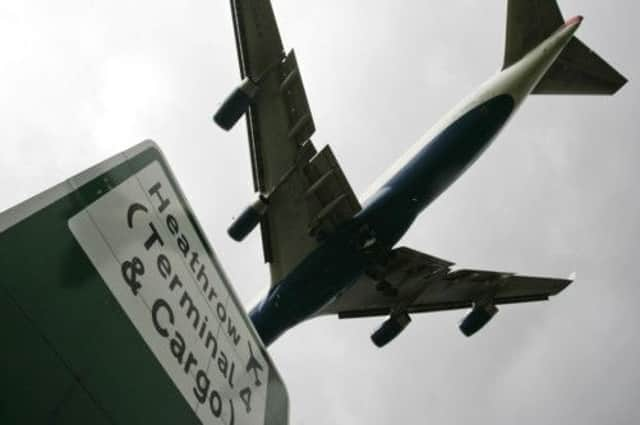George Kerevan: Dithering over Heathrow damages Scotland


These days he would probably have a different premise: hell is spending time in any major airport. Yet here’s the curious thing: airports are now the central fulcrum around which the global economy is hinged.
More than a third of all the goods traded in the world (by value) go by air. The global manufacturing economy is based entirely on just-in-time supply of parts and components, which is only possible through air transport. Burgeoning internet retail commerce depends increasingly on postal delivery using overnight cargo planes. In short, economic growth = airport growth.
Advertisement
Hide AdAdvertisement
Hide AdIn 2010, when an Icelandic volcano grounded transatlantic and European flights, much of the world’s economy shut down. Farmers in Egypt, Kenya and Ghana could not get their crops to European supermarkets. BMW halted car production when components ran out. And I’ve not even mentioned the wholesale destructive impact on tourist travel.
All this is important to remember when it comes to understanding the debate over the future of Heathrow Airport. Last year, the Coalition Government reversed its manifesto pledge to veto Gordon Brown’s plan for a third runway at Heathrow. Instead, it set up the Davies Commission to review how the UK might expand its airport capacity in the South-east.
The Davies Commission failed to hold any public sessions in Scotland yet nobody at Holyrood raised a peep – a sign we have failed to grasp how important the airport debate is to us. The future of Scottish connectivity with the rest of the world is directly affected by what happens – or does not happen - at Heathrow. Our banking, oil and tourism industries, which account for a third of Scottish GDP, are heavily air-dependent, particularly on Heathrow. That will remain true whichever way we vote in the referendum.
The vital point to grasp is that modern air routes operate on the hub and spoke principle. Outside of short regional interconnections, most flights go via a central hub airport before changing planes to reach their final destination. This is true of cargo as well as people. Using a hub to pool passengers, many fewer planes can reach many more cities than if you fly direct routes. The result is greater connectivity and cheaper flights.
There’s a downside: this model is dependent on the efficiency of the hub airport. Unfortunately, hub airports like Heathrow soon get swamped by growing traffic. Expanding them, or building new hubs, is exceedingly difficult, politically and economically. Local residents object fearsomely to noise pollution and inconvenience. Yet moving to a greenfield site is humongously expensive as it means replacing the entire transport infrastructure connecting to the airport. A new London airport could cost anything up to £65 billion, roughly half Scotland’s GDP. This is one reason the Government has postponed any decision on Heathrow till after the next general election, if then.
There is a body of opinion that says we don’t need to expand Heathrow or replace it – a joy to the ears of Tory politicians desperate to avoid taking difficult decisions in marginal West London seats. For self-styled environmentalists, strangling the growth of air travel by limiting runway capacity is an end in itself. Others argue there is ample capacity in London outside Heathrow, noting the capital is served by six different airports. You can also make a case that Heathrow is still ahead of its European rivals in providing flights to the world’s key business destinations: 990 departures per week compared to 484 at Charles de Gaulle and 450 at Frankfurt (2011 data). So no hurry, then.
These arguments ignore the fact that Heathrow is operating at 98 per cent capacity. A few centimetres of snow and the airport grinds to a halt. It is also without contest that Heathrow offers far fewer key Asian destinations than either Paris or Frankfurt, which between them have over 2,000 more flights per year to China. Above all, a dangerous trend is clear at Heathrow: the number of different destinations it serves has fallen by 20 per cent over the past two decades.
Why not spread the load between Heathrow, Gatwick, Stansted and Luton? This argument misses the point about airfreight, which is crucial to the economy. Genuine hub airports attract a vast investment in manufacturing, logistics and jobs. Heathrow shipped 1.5 million tonnes of freight last year, more than all the other UK airports combined. Compare this to a paltry 97,000 tonnes from Gatwick, which lacks the industrial or transport infrastructure for freight.
Advertisement
Hide AdAdvertisement
Hide AdSo there is no ducking a solution to Heathrow congestion. Either Heathrow gets a third (and potentially a fourth) runway, which is the cheapest option as it plugs into the existing infrastructure. Or a new airport is built at the Isle of Grain in the Thames Estuary – Mayor Johnson has now shifted to this model, abandoning his original extravagant idea of constructing Boris Island.
Doing nothing at Heathrow – which is odds on, given Westminster’s craven politicians - will have severe implications for Scotland. Inevitably, Scottish connections to Heathrow will be squeezed to maintain precious slots for international routes. Some Scottish flights can be scattered to other London airports. But splitting the London hub into fragments undermines the economic rationale for the hub and spoke system. That will raise costs on Scottish routes and reduce the number of onward flights to Europe available from Scotland. Worst of all, to manage capacity, Air Passenger Duty will rise exponentially, hitting Scottish passengers in their wallets.
The Heathrow issue is a classic case of London domestic politics taking precedence over UK and Scottish needs. Scotland and the English regions need to make their voices heard in this discussion.